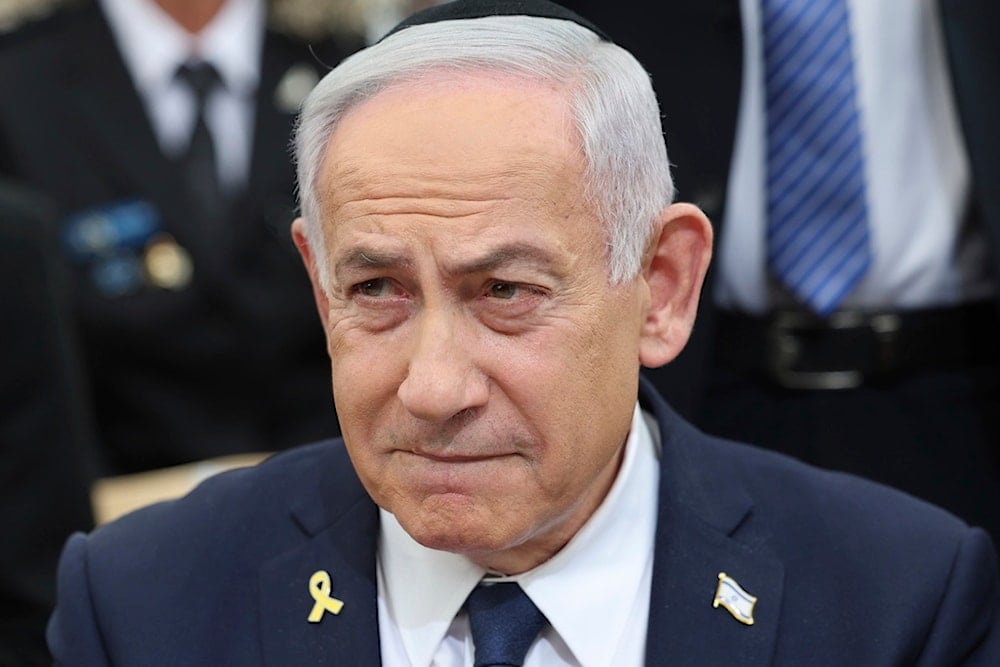Netanyahu Shin Bet pick opposed prisoner swap deal, stirring outrage
PM Netanyahu’s appointment of Maj. Gen. David Zini as Shin Bet chief has triggered fierce criticism from hostage families and top military figures, after reports surfaced that Zini opposes any ceasefire or captives deal in Gaza.
-

Israeli Prime Minister Benjamin Netanyahu at the Yad LaBanim Memorial in occupied al-Quds, occupied Palestine, on April 29, 2025 (AP)
A reported comment by Maj. Gen. David Zini, Prime Minister Benjamin Netanyahu’s controversial pick to head the Shin Bet, has sparked outrage among families of captives held in Gaza, after he allegedly voiced opposition to a Gaza ceasefire and a captives deal.
According to Channel 12, Zini stated in a closed Israeli occupation forces (IOF) session: “I’m against hostage deals. This is an eternal war.” The timing and exact wording remain unconfirmed, but the quote has resurfaced now that Zini is set to play a key role in negotiations.
Netanyahu announced Zini’s appointment on Thursday, bypassing Attorney General opposition and reportedly selecting him after a brief, informal conversation during a visit to the Tzeelim base. The move came just one day after the High Court ruled Netanyahu could not dismiss current Shin Bet head Ronen Bar, who is set to resign next month.
Zini 'lacks intelligence background'
The Hostages and Missing Families Forum called the reported remarks “horrifying and contemptible,” with relatives of captives expressing deep distrust in Zini. Critics argue the selection reflects Netanyahu’s personal political agenda, especially given Zini’s lack of an intelligence background.
IOF Chief of Staff Lt. Gen. Eyal Zamir, who was not consulted in the decision, reportedly reprimanded Zini for engaging with the prime minister without authorization and voiced concerns over his qualifications. Zini was relieved of his military post Friday but is expected to take over the Shin Bet unless the High Court intervenes.
Netanyahu prolonged war, jeopardized captives
Former Israeli Chief of Staff and National Unity lawmaker Gadi Eisenkot also urged Zini to reject the appointment, warning that Netanyahu has jeopardized hostage rescue efforts and prolonged the war through erratic leadership. In an open letter, Eisenkot advised Zini to wait for legal clarity and allow for a more qualified candidate to be selected with broader consensus.
“Zini, I commanded you for most of your military service. I appreciate your operational capabilities and your courage,” Eisenkot wrote. “But I also know you have the wisdom to do the right thing.”
He called on Zini to act “in the interest of the state, even at personal cost,” and to allow for a more qualified candidate to be chosen through a process that enjoys national consensus, especially in a period he described as one of the “longest and most difficult wars in Israel’s history.”
Unless blocked by the High Court, Zini is expected to replace Ronen Bar next month, raising critical questions about the independence of Israeli intelligence services and the government’s commitment to securing the release of the remaining hostages.
War on Gaza cover for Netanyahu
Nearly 20 months after October 7, 2023, "Israel’s" Gaza war has reached a critical juncture, argues former Prime Minister Ehud Barak in an opinion piece published by the Financial Times.
In a sharply worded critique, Barak denounces the continuation of the war as a “strategic disaster,” urging Israeli leadership to pursue urgent political clarity and moral responsibility.
Barak lays out two choices: either reach a deal that secures the release of all remaining captives and ends the war, or continue pursuing what he calls the illusion of “total victory” over Hamas through military force. He warns that renewed fighting in Gaza is not only futile but endangers the remaining captives and deepens the humanitarian catastrophe in the Strip.
Barak contends that reaching a captive deal would overwhelmingly serve "Israel’s national interest." It would bring captives home, halt the destruction, ease the humanitarian crisis in Gaza, and unlock prospects for "regional diplomacy". He envisions a future where "Israel" could engage in initiatives such as "normalized relations with Saudi Arabia and participation in the India-Middle East-Europe Economic Corridor."
International pressure mounts on Israeli leadership
According to Barak, global patience is running thin. US President Donald Trump reportedly warned Netanyahu, “We will abandon you if you do not end this war.” Allies, including France, the UK, and Canada, have demanded a ceasefire and restoration of humanitarian aid. The UK has already paused trade negotiations.
Barak sees this external pressure as an opportunity, not a threat, for "Israel" to change course and secure what he described as long-term regional gains.
Despite the destruction, Barak insists a workable plan for postwar Gaza remains possible.
Barak blames the current crisis on Netanyahu’s political motives and longstanding strategic miscalculations.
He accuses Netanyahu of ignoring a core military tenet shared by thinkers like Clausewitz and Kissinger, which stipulates that war must serve a clear political objective. Instead, Barak argues, Netanyahu has weaponized the war to protect his own position. “The prime minister is not acting in the national interest; he is acting purely for self-preservation. Every other argument is a smokescreen.”

 5 Min Read
5 Min Read








